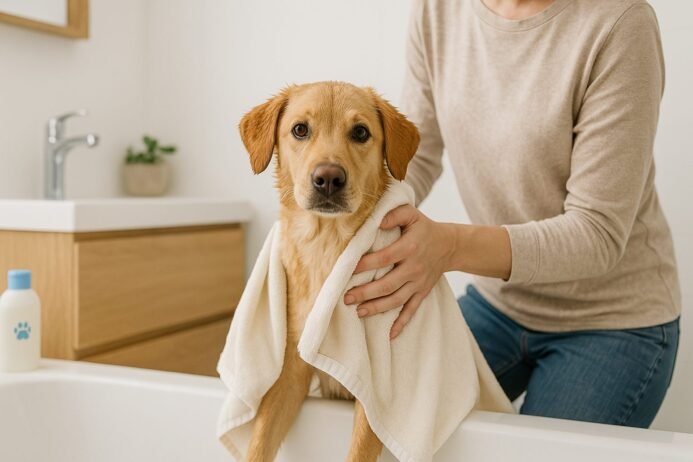Why Does My Dog Stink?
- 23 September 2025
- BuyAPet Editorial Team
- All Dogs, Cats and Dogs, Dog Health
Why Does My Dog Stink?
Is your dog a bit whiffy? Here’s how to tell normal doggy smell from problem odour—and what to do about grooming, ears, skin, diet and dental health.
Normal vs problem smells
A mild “dog smell” after rain or exercise is normal. Persistent, strong, fishy, sour, metallic or yeasty smells usually point to a fixable issue.
- Brief & mild: normal environmental odour.
- Strong & lingering: check grooming, ears, skin, diet and teeth.
Grooming mistakes
- Bathing: use dog shampoo every 4–8 weeks (breed & lifestyle dependent).
- Rinse & dry: soap residue or damp undercoat = musty smell.
- Coat care: brush to remove dead hair and distribute oils.
- Anal glands: fishy odour may signal impaction—see your vet or groomer.
Ear infections
Yeast/bacterial ear infections cause a sweet, sour or “cheesy” smell. Floppy-eared breeds are higher risk.
- Check weekly for redness, discharge or head-shaking.
- Clean only with vet-approved ear cleaner.
- See your vet if signs persist—don’t use cotton buds inside the canal.
Skin issues
- Yeast dermatitis: sweet, musty smell—often in skin folds, paws, ears.
- Bacterial infections: stronger sour odour with redness or oozing.
- Allergies/fleas: itching → broken skin → secondary infection.
If there’s redness, hair loss or constant scratching, book a vet appointment.
Diet & digestion
- Feed a complete, balanced diet for your dog’s life stage.
- Avoid fatty table scraps—can cause tummy upsets and flatulence.
- Recurrent gas or soft stools? Ask your vet about food trials or probiotics.
Dental health
- Brush teeth 2–3× weekly with dog toothpaste.
- Use dental chews/toys to reduce plaque between brushes.
- Arrange regular dental checks—small breeds are higher risk.
Prevention checklist
- ✔ Bathe with dog shampoo; rinse & dry thoroughly.
- ✔ Weekly ear checks; use vet-approved cleaner as advised.
- ✔ Daily brushing for heavy shedders; regular coat care.
- ✔ Balanced diet; limit scraps; monitor stools & gas.
- ✔ Toothbrushing + dental chews; schedule vet dental checks.
- ✔ Vet visit for persistent or sudden strong odour.
FAQs
How often should I bathe my dog?
Usually every 4–8 weeks, more often for muddy adventures or skin conditions (follow your vet’s advice). Overbathing can dry the skin.
My dog’s breath is awful—what should I do?
Persistent bad breath often signals dental disease or tummy issues. Book a vet check, start toothbrushing, and consider dental chews as a helper—not a replacement.
What’s that fishy smell sometimes?
Likely anal glands expressing or becoming impacted. If it’s frequent or your dog is scooting/licking, ask your vet to examine and treat.
Could smell mean a medical emergency?
Sudden, severe smell with lethargy, vomiting, painful ears/skin, or wounds needs prompt veterinary attention.
